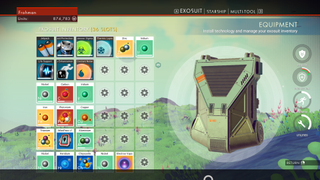
As we and many other keep saying—dammit, dammit, why is No Man’s Sky’s inventory so small, oh hell I have to throw out another stack of plutonium, this is the devil’s work, and so on. The first thing we all asked each other while playing was ‘how do you expand your inventory?’
Visit space stations with an Atlas Pass
Space stations can solve all of your inventory problems, though it’ll cost you. Every space station has a room on the second floor containing an alien NPC and a trade terminal. There’s another room, however, on the opposite side of the landing pad, locked with a door that requires a v1 Atlas Pass to open. To find these, well, good luck. They’re random drops from Operation Centers and certain NPC aliens, but if you follow the Atlas Path, you’ll find one sooner than later.

Once you’ve got a pass, unlock the door and down the hallway you’ll find a single-use Exosuit slot vendor. The first time you visit one of these vendors, the slot is given to you for free, but each time after it will cost you 10,000 more (so your third extra slot will be 20,000, your fourth 30,000, and so on.) The extra space pays for itself quickly, so unless you have a particular ship on the wishlist, don't hesitate to purchase slot expansions like mad.
Find pods on planets
You can also come across these Exosuit vending machines on a planet’s surface. Drop pods can be found here and there while you’re flying around: just look for something like this:
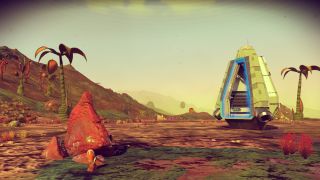
Again, for each new slot you buy the price will increase by 10,000 units, but it’s not uncommon to find multiple pods on a planet’s surface (at one point I passed over five of them in the span of a minute). They sometimes show up as a question mark when you scan a planet, sometimes they’re just sitting there and can be spotted without an icon.
If you want to increase your chances of finding a pod on a planet, try using a Bypass Chip to activate a scanner, and then using the scanner to mark nearby shelters. It’s no guarantee of finding an Exosuit pod, but they can often be found in the vicinity of shelters.
Find busted ships
The most direct way to get more space is to just buy a bigger ship from a space station or trading depot landing pad, but it can take a while to earn the few million credits you’ll need. We have a separate guide to getting rich, so pop over there for tips on being a space trade mogul.
The biggest gaming news, reviews and hardware deals
Keep up to date with the most important stories and the best deals, as picked by the PC Gamer team.
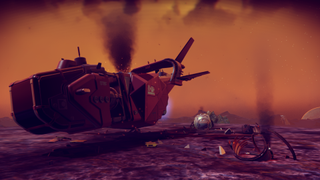
If you’re lucky, though, you might find a bigger busted ship which you can claim for free. The best way to find downed ships is by using signal scanners to highlight all the nearby points of interest on a planet. Crashed ships show up as a small white dot on the UI, and doesn’t necessarily guarantee one. The dot just signifies a general point of interest at which you might also find a pod with an exosuit upgrade—a win-win really.
Keep in mind, many of the systems on a downed ship will require repairs, so you're paying for that extra inventory space with a lot of time spent gathering resources.
Upgrade your Multitool inventory too
Your multitool also has inventory slots, though you can’t store items in them, only upgrades for the tool itself. As you find blueprints for mining and weapon upgrades, your starter tool will quickly run out of room.
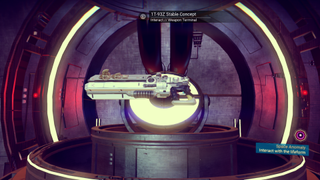
Adding slots to your multitool can only be accomplished by replacing the tool with a better one (or at least a roomier one). Sometimes you can find these mounted on the walls of the interior of buildings, and can swap them for free. Other times, it’ll cost you. If and when you visit a space anomaly (you’ll know one when you see one), each one contains a locked compartment (it looks like a large metal silo) where you can choose to purchase a new multiool.
And, when talking to alien NPCs and passing their tests (most conversations are language comprehension test) you may from time to time be awarded tools with additional slots. Just compare what’s in those slots very carefully: gaining an additional slot or two in your tool might not be worth losing the upgrades you’ve made to your own gun.
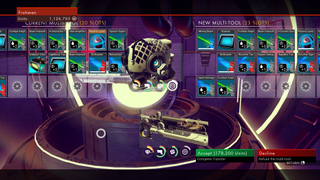
The collective PC Gamer editorial team worked together to write this article. PC Gamer is the global authority on PC games—starting in 1993 with the magazine, and then in 2010 with this website you're currently reading. We have writers across the US, UK and Australia, who you can read about here.
Most Popular




